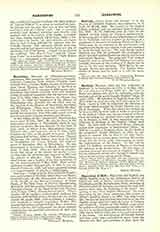

Harrison, WILLIAM, third and last archpriest of England; b. in Derbyshire in 1553; d. May 11, 1621. He was educated at Douai (1575-77). He went to Rome as a deacon and, after his ordination, took the mission oath at the newly founded English College (April 23, 1579). He labored in England from 1581 to 1587, when he went to study civil and canon law at Paris. Early in 1591 he undertook the direction of the small school founded by Father Persons, S.J., at Eu in Normandy. When this school was broken up by war, in 1593, he went back to Reims as procurator to the English College and, having returned to Douai when the college was restored there, took his doctor-ate in divinity, in 1597, in that university, and was professor of theology at the English College until 1603. He then spent five years in Rome, where he gained wide experience in ecclesiastical affairs. In 1609 he returned to England, where, on the death of the archpriest, George Birkhead, in 1614, he was chosen to succeed him by Paul V (July 11, 1615). His policy was to restore peace between the secular clergy and the Jesuits while endeavoring to secure the independence of the former. To this end he aided Dr. Kellison, president of Douai, in lessening the influence of the Jesuits there. He also aimed at restoring episcopal government in England. His influence ultimately secured this, though he himself died just as his envoy was setting out for Rome.
EDWIN BURTON

